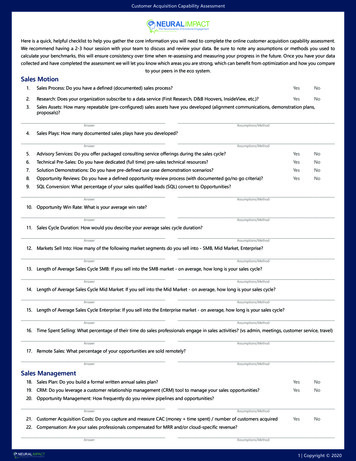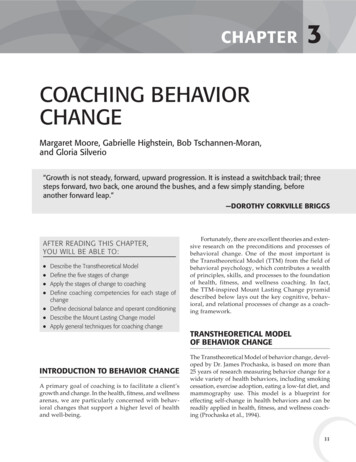
Transcription
Key Skdd
ContentsI.Introduction . pg. 2II.The WHY Behind Sales Coaching . pg. 3III.Sales Coaching Mindset . pg. 6IV.Creating a Collaborative Sales Coaching Environment . pg. 8V.When NOT to Use Sales Coaching . pg. 10VI.Tapping Into Managers' Sales Coaching Abilities . pg. 16VII.How to Rescue a Sales Rep During a Coaching Call . pg. 18VIII.Dealing with Sales Reps Who Don’t Want to Be Coached . pg. 20IX.Six Key Skills Used by Great Coaches . pg. 23X.About the Authors . pg. 26XI.About Sales Readiness Group . pg. 27I. IntroductionIndustry research shows that effective sales coaching can dramatically improvethe performance of a sales team – in some cases driving up revenues by 20% or more.The reason for such potential improvements is the significant “multiplier effect”sales organizations can achieve through sales coaching: one trained manager cancoach multiple sales professionals and improve their overall performance. With suchpotential benefits it is no wonder that many sales organizations recommend that theirfrontline sales managers spend 25% - 45% of their time sales coaching.The High Impact Sales Coaching Guide provides expert advice on essentialsales coaching skills to help sales managers effectively empower their teams to reachtheir highest potential.Copyright 2015 Sales Readiness Group, Inc.2
II. The Why Behind Sales Coachingby Norman BeharSales coaching empowers sales reps to improve selling skills and close morebusiness. Industry research backs this up. For example, CSO Insights has uncoveredthe relationship between companies that have coaching programs that exceedexpectations and the percentage of sales reps achieving quota.Despite the compelling research, most managers spend the bulk of their time onother activities (e.g., selling, preparing forecasts, attending meetings) and neglect todevelop the one skill that can have the biggest impact on sales.At Sales Readiness Group, we’ve typically found that managers have fourresponses when we ask why they’re not investing more time in sales coaching:1. They don’t understand the benefits of sales coaching.2. They don’t feel they have enough time3. They’re concerned about hurting a sales rep’s confidence4. They’re not sure how to coachThese are all legitimate concernsCopyright 2015 Sales Readiness Group, Inc.3
Response #1: I Don’t Understand the Benefits of Sales CoachingIndustry data is compelling, but it’s clearly not enough to prove the impact ofsales coaching. Sales managers need to understand why coaching has such a highreturn on investment. Let’s start by defining sales coaching: Sales coaching focuses onhelping reps develop the skills, knowledge, and use of strategies that improve salesresults.Based on this definition, the reasons why reps benefit from sales coaching arestraightforward. Those who are well coached have better selling skills and strongindustry and product knowledge. They also know how to think strategically about salesopportunities to generate higher, more profitable sales.Response #2: I Don’t Feel I Have Enough TimeSales managers work extremely long hours, especially when you take intoaccount traveling, preparing forecasts, and attending internal meetings.In most cases, however, a significant amount of their time is spent in their role aschief problem solver, as opposed to “sales enabler.” They often find themselvesresponding to sales reps’ requests for assistance to resolve client issues andopportunities. While this may have great short-term benefit in terms of closing morebusiness, it undermines what should be their longer-term objective, which is to helpsales reps learn to solve many of these problems on their own.For example, a sales manager may be able to tell a sales rep what he or sheshould do to advance a stuck opportunity. In doing so, however, that manager has lostthe opportunity to allow the sales rep to explain what he or she thinks are the bestoptions, consider other options, and discuss how to best proceed given the alternatives.While coaching will require more of the sales manager’s time in the short term, itultimately leads to a more productive, empowered, and motivated sales team. In turn,that frees up the sales manager’s time.Response #3: I’m Concerned about Hurting the Sales Rep’s ConfidenceThis concern is warranted if the company lacks a coaching culture and usescoaching as a way to critique bottom performers.Copyright 2015 Sales Readiness Group, Inc.4
First and foremost, coaching needs to be genuinely helpful and focused on repdevelopment. Second, coaching is rarely successful with reps who have a history ofpoor performance. Sales coaching is best when focused on middle and even higherperforming reps who have the capacity and desire to improve. The following chartillustrates where sales coaching can have the greatest impact and where othermanagement actions are required.Coaching is about moving the middle and, ultimately, improving sales repperformance and increasing confidence levels as reps develop even better selling skills.Response #4: I’m Not Sure How to CoachWhile some sales managers may have natural coaching instincts (i.e., a desire toteach and help others succeed), there is no reason to expect that a manager will knowhow to coach without coaching skills and a coaching process. Fortunately, there are anumber of great sales-coaching programs that sales managers can take advantage of,including SRG’s High Impact Sales Coaching program.Becoming a great sales coach requires time and dedication. It is, however, notonly worthwhile in terms of business impact, but also in the satisfaction the salescoaches feel as they see their reps’ selling skills and confidence grow.Copyright 2015 Sales Readiness Group, Inc.5
III. Sales Coaching Mindsetby David JacobySales managers must master the critical skill of sales coaching in order tomaximize the sales performance of their teams. The role of a sales coach cannot beover-estimated for any high performing team. One common obstacle that many salesmanagers encounter when they try to coach their teams is getting “buy-in” – i.e.,convincing a salesperson to try a new approach or change a behavior. While it is easyto blame the salesperson in these situations, sometimes it is the sales managersapproach to sales coaching that is the root cause of the problem. All too often thesemanagers engage in “telling” as opposed to collaborative sales coaching.If a salesperson is performing a skill incorrectly, what’s wrong with telling asalesperson what to do? Skills require time, effort and motivation to develop or change.So while telling a salesperson what to do or say may seem expedient in the short-run, itrarely is effective in the long-run. That’s because the salesperson is most likely to listenand change their behaviors if they feel they have been part of the process as opposedto being told what to do. So one of the essential qualities of effective sales coaching iscollaboration between the sales manager and the salesperson where both co-createand implement a plan to improve skills – the opposite of telling.In order to avoid telling and create collaborative sales coaching environment, werecommend that a sales manager enter into each sales coaching conversation with amindset based on the 3 A’s: (1) Ask Before Advocating, (2) Actively Listen, and (3)Assume Best Intentions.Ask Before AdvocatingYou have just observed one of your salespeople on a sales call where you sawthem make a number of mistakes. You are now ready to sit down with the salespersonand debrief the call. Even if it is obvious to you what the salesperson did wrong on thecall, it is critical that you start the debrief process by asking questions. The purposebehind asking questions first is to promote self-discovery by the salesperson, since selfdiscovery is the most persuasive motivator of behavior change. Even if you eventuallyCopyright 2015 Sales Readiness Group, Inc.6
have to advocate your position, such advocacy will be more effective if you start withquestions because the process is more collaborative. A salesperson is much more likelyto change a behavior if they discover the gap themselves.Good sales coaching questions to ask include:What ?What else did the customer say?What surprised you about the customer’s reaction?What did you notice when you started asking the customer more questions?So what.?So what did you notice?So what went well?So what could have been better?Now what.?Now what steps would you take?Now what would you do differently?Now what questions do you have?Actively ListenThe only thing worse than not asking questions is asking questions but notlistening to the answers. Listening is a great way to help build a collaborativerelationship with a salesperson during the sales coaching process. Unfortunately, manysales managers are poor listeners – they feel like they need to do all of the talking. Mostsuccessful sales coaches excel at “active listening” which means they are suspendingtheir own thoughts when the salesperson is speaking and focusing 100% on listening tothe salesperson.It is not enough to listen to a salesperson. The salesperson must also FEEL thatyou are listening to them. Great listeners do this by using such techniques as askingquestions, paraphrasing, summarizing and emphasizing.Copyright 2015 Sales Readiness Group, Inc.7
Assume Best IntentionsSales coaching should never be viewed as remedial or a punishment for poorperformance. Great sales coaches assume that their salespeople want to improve theirskills and this helps create a positive environment where the salesperson is motivatedto engage in behavior change.IV. Creating a Collaborative Coaching Environmentby David JacobyWhen most of us think of great coaches, the picture that frequently comes tomind is that of tough, no nonsense “field generals” – Vince Lombardi, John Wooden, orJoe Torre – screaming at players, officials and opponents.But this is only one aspect of coaching. As fans we usually don’t see how famouscoaches are also great teachers during practice sessions, getting their players to buy into new ideas, techniques, and strategies with a goal of constant improvement.One of the most essential qualities of effective coaching is that it’s highlycollaborative. Why be collaborative, why not tell people what to do? Because tellingrarely leads to long-term behavior change.Collaboration is key to transferring the “heavy lifting” of changing behaviors fromthe coach to the person being coached. When someone feels that they are an activeparticipant in the coaching process, that person is more willing to make the timecommitment necessary to change their own behaviors. This is just as true with starathletes as it is with salespeople.So what can you do to create a more collaborative sales coaching environment?Co-define coaching outcomesA great way of getting the salesperson’s buy-in is to co-define the coachingoutcomes with the salesperson.Start the coaching process by co-assessing the salesperson’s sales behaviorsand jointly identify the salesperson’s strengths, development needs and areas whereCopyright 2015 Sales Readiness Group, Inc.8
you have disagreements. Then co-define which behaviors will be addressed during thesales coaching process.Many sales managers have an aversion to co-defining coaching outcomes. Afterall, if a salesperson on your team is executing a skill incorrectly, just tell them to fix it.But remember, no one likes to be told what to do and salespeople are no exception.That is why just “telling” often results in resistance and not behavior change.Establish clear rolesOne of the most common forms of sales coaching is when the sales managerobserves a salesperson in action on a sales call and then provides coaching feedbackafter the call. In order to ensure success of such coaching calls, and to prevent thesales manager from jumping in and taking over the call (a common occurrence), it isessential that the sales manager and salesperson establish clear roles prior to the call.As a sales manager, there are three types of sales calls that you can go on witha salesperson:1. Joint Call: The most common type of call. Here you are accompanying thesalesperson on the call to help them sell. For example, the salesperson needshelp with a large, complex opportunity. This type of call is the least desirable froma coaching standpoint.2. Coaching Call: The most effective type of sales call. Here the salesperson sellsand you are the observer. You observe best when you're not involved.3. Modeling Call: The third type of call where you sell and the salespersonobserves. This is appropriate for a new salesperson that doesn't yet haveexperience or confidence. This approach will also work for someone who has apersistent development need that you can best address by demonstrating the“right” way.By understanding which type of joint sales call you are going on with thesalesperson, you can clearly establish respective roles for the call.Copyright 2015 Sales Readiness Group, Inc.9
Ask firstAsking questions before expressing your own opinion is critical to effectivecoaching. The purpose of asking questions is to promote self-discovery.Sales people will take more ownership of changing their behavior if they feel theyare discovering problems and solutions on their own. By asking questions, you helpthem w
Sales managers need to understand why coaching has such a high return on investment. Let’s start by defining sales coaching: Sales coaching focuses on helping reps File Size: 786KBPage Count: 27











